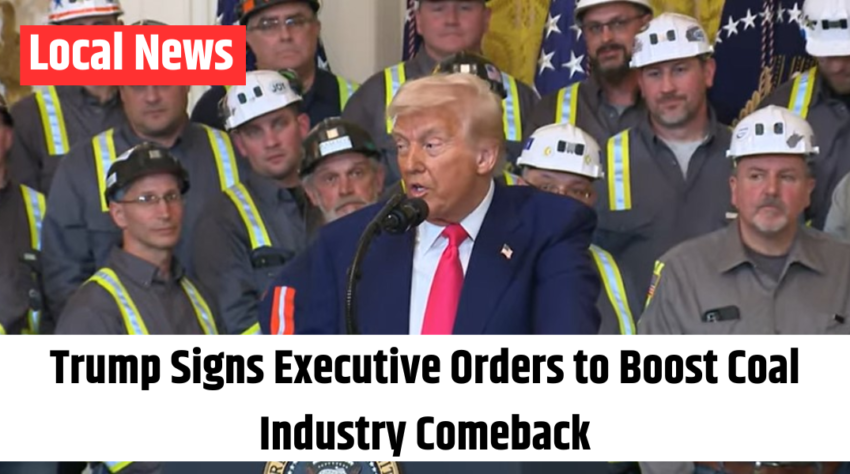WASHINGTON, D.C. — Former President Donald Trump is making a major push to bring coal back to the forefront of America’s energy landscape, signing a series of executive orders he says are essential to securing the nation’s power future—especially with the rapid growth of energy-hungry artificial intelligence data centers.
Standing alongside coal miners, including many from West Virginia, Trump announced measures aimed at boosting fossil fuel use—particularly coal—as a reliable energy source for the country’s future. He emphasized that the United States holds vast energy resources that should be used to fuel economic development and protect national security.
One of the signed executive orders halts plans to retire dozens of coal and nuclear power plants slated for closure this year. Instead, Trump has directed the Department of Energy to assess the reliability of the nation’s power grid and to use emergency authority, if necessary, to keep critical plants running—even if they’re not profitable.
“About 42 power plants were scheduled to go offline this year,” said Chris Hamilton, President of the West Virginia Coal Association. “With electricity demand rising, it’s very possible those facilities will now be kept in service.”
Trump told supporters at the White House that his administration is ensuring coal-fired plants remain available to meet the country’s growing energy needs. “These plants are crucial,” he said. “We’re not going to let anyone shut them down without a fight.”
The former president also vowed to protect coal investors and workers from future political shifts, saying his policies would provide long-term certainty.
Also Read – DOGE Cuts Lead to Indefinite Suspension of WV Humanities Council Grants
“You’ll never again have to worry that your career, your investment, or your community will be wiped out by some bureaucratic whim,” Trump declared.
In another executive action, Trump authorized new coal leases on federal land and proposed declaring coal a “critical mineral,” a move that could accelerate permitting and production. He also directed the Justice Department to challenge state and local policies that restrict coal use, calling such regulations unconstitutional.
“I’m ordering the DOJ to push back against every overreaching state policy that harms our miners,” Trump said. “We’re removing all federal objections to coal development.”
This policy shift stands in sharp contrast to the Biden administration’s emphasis on renewable energy sources and reduced reliance on fossil fuels. Hamilton remarked on the dramatic change: “Just one man, and a few months’ difference, can really turn the tide.”
Still, coal faces stiff competition from natural gas and renewables like solar and wind, which enjoyed policy support under both the Biden and Obama administrations. Whether Trump’s approach will overcome these market forces remains uncertain, though Hamilton remains hopeful.
“We’re regularly asked why we’re not building new coal or coke plants despite our deep metallurgical reserves,” he said. “With this support, we’re working on changing that.”
Trump touted the economic potential of coal, saying its untapped value far exceeds that of gold stored in Fort Knox. “We’re unlocking America’s energy wealth,” he said. “This is about powering our future and bringing prosperity back to our communities.”
A core part of his 2024 campaign promise, Trump’s coal-forward energy strategy includes plans to use fossil fuel-generated electricity to power new AI data centers, with West Virginia playing a pivotal role. State lawmakers are currently advancing legislation to allow the creation of microgrids to serve these data-heavy operations.
While Chris Hamilton declined to attend the White House event so he could stay in Charleston and monitor the progress of the microgrid bill, other officials—including U.S. Senators Jim Justice and Shelley Moore Capito, along with Governor Patrick Morrisey—were present for the signing ceremony.
Trump framed the energy initiative as a matter of national security and economic independence. Hamilton echoed the sentiment, saying coal’s reliability makes it a strategic resource for the future.
But environmental groups pushed back, calling the orders regressive. Kit Kennedy of the Natural Resources Defense Council criticized the move: “Coal is outdated, polluting, and not competitive. A modern electric grid needs cleaner, more flexible solutions.”
There’s also uncertainty around whether the tech sector—especially companies developing data centers—will embrace coal-fired electricity. Many tech firms have favored renewables and committed to net-zero carbon goals. Trump, however, insisted renewables alone can’t meet the growing demand and blamed prior administrations for waging a “war on coal.”
Also Read – New WV Law Lets Certified Professionals Work Without Extra Exams
The executive orders also instruct the Department of the Interior to map the nation’s coal reserves and expand leasing options on federal land, while the EPA is tasked with reviewing and potentially relaxing environmental regulations to keep coal plants operating longer.
In response, Lisa Di Bartolomeo of the West Virginia Beyond Coal Campaign issued a sharp critique:
“Politicians keep coming through coal country with empty promises. What they really want is to squeeze out the last profits from Appalachia. These moves gut environmental protections and sideline cheaper, cleaner power sources—all while undermining workers and communities.”
Despite the backlash, Trump’s message was clear: revitalizing coal is central to his vision for America’s energy future, and he believes doing so will help power the country’s next technological leap.
